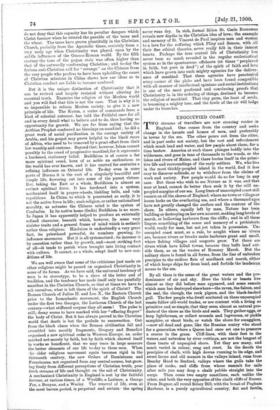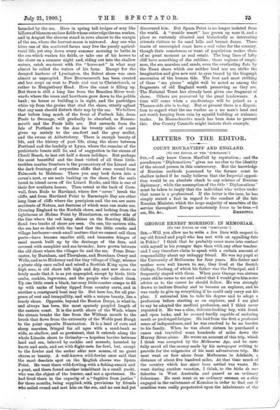UNOCCUPIED COAST. T WO streams of travellers are now crossing routes
in England. One comes from the country and- seeks change in the• haunts and homes of men, and preferably in towns by the sea. The other pours out from the cities, and in part seeks not society, but the rest and refreshment which much land and water, and few people about them, for a time bestow. America at such times plunges boldly into the wilderness, and goes in tens of thousands to the woods, or the lakes and rivers of Maine, and there buries itself in the primi- tive life and surroundings of the early settlers. We, who live in the most thickly-peopled island in the world, find it less easy to discover solitude, or to withdraw from the claims of work and society. Few people would do so for long in any case. But those who wish to see Nature as it was, and that near at hand, cannot do better than seek it by the still un- peopled margins of our sea. Long lines of unoccupied coast still remain on all the shores of England, where no town or villageor house looks on the everlasting sea, and where a thousand ages have not greatly changed the surface and the contour of the shore. In others, equally left by man, Nature has been building or destroying on her own account, making long levels of marsh, or hollowing harbours from the cliffs ; and in all these lingers something of the sense and memory of a prehistoric world, ready for man, but not yet taken in possession. "Un- occupied coast must, as a rule, be sought where no rivers are, because rivers or brooks make harbours great and small, where fishing villages and seaports grow. Yet there are rivers which have killed towns, because they built land out- side them, as on the wastes of Romney Marsh. But the solitary shore is found in all forms, from the line of unbroken precipice to the endless flats of sandbank and marsh, either of which keeps ships far from land, and forbids the landsman access to the sea.
By all these is the sense of the great waters and the pre- dominance of air and sky. -Here the birds or beasts live almost as they did before man appeared, and some remain whieh man has destroyed elsewhere—the raven, the falcon, and the seal, the chough, the rook pigeon, and the black-backed gull. The few people who dwell scattered on these unoccupied coasts follow old-world trades, or are content with a living so primitive and so simple, that they seem almost as natural pro- ducts of the shore as the birds and seals. They gather eggs, or keep lighthouses, or collect mussels and lugworms, or pickle samphire, or shoot birds, or watch the shore for smugglers, —now all dead and gone,-like the Russian sentry who stood for a generation where a Queen had once set one to preserve a crocus in the grass. Cliff-lines, with their feet in the waters, and unbroken by river cuttings, are not the longest of these tracts of unpeopled shore. Yet they are many, and much varied in colour, crag and crest. In the South the precipice of chalk, with high downs running to its edge, and sweet farms and old manors in the valleys inland, rune from Beachy Head to Seaford, valleys where the gulls take the place of rooks, and cliffs from whose summit for • mile after mile you may drop a chalk pebble straight into the surge. Then come two empty coastlines, each unlike the other, and both the very opposites of the chalk cliffs of Sussex. From Bognor, all round Selsey Bill, with the break of Pagham Harbour, is a purely agricultural country, flat and fertile, bounded by the sea. Here in spring tall hedges of may like billows of blossom enclose fields whose outer edge the sea washes, and in August the sheaves stand in rows almost to the margin of the sea, where the harvest-moon is mirrored. Any one who hires one of the scattered farms may live the purely agricul- tural life, yet step down every summer morning to bathe in the sea which washes his fields, or take one of his horses to the shore on a summer night and, riding out into the shallow waters, catch sea-trout with the " horse-net" in what may almost be called the waters of his farm. Except for the decayed harbour of Lymington, the Solent shore was once almost as unpeopled. Now Bournemouth has been created and has crept on west to Poole and east to Christchurch, or rather to Hengistbury Head. Here the coast is filling up. But there is still a long line from the Beaulieu River west- wards where the roses and hawthorn grow down to the pebble bank; no house or building is in sight, and the partridges whirr u from the groins that stud the shore, utterly aghast that any man should disturb their nap by the sea. We believe that before long much of the front of Purbeck Isle, from Poole to Swanage, will gradually be absorbed, as Bourne- mouth and the Poole hills are. But onwards from the Isle of Portland to the Axe lie twenty miles of coast given up mainly to the sea-fowl and the grey mullet, and the swans at Abbottsbury. There is enough beauty of life, and the his' tOry of past life, along the shore between Portland and the landslip at Lyme, where the remains of the prehistoric beasts still lie, and of suggestion in the stones of Chesil Beach, to last ont half a dozen holidays. But perhaps the most beautiful and the least visited of all these little- trodden marine frontiers is the promontory of the Lizard and the dark frontage of serpentine cliffs that runs round from Falmouth to Helstone. There you may look down into a raven's nest, or see seals basking-on the shore, for the seals breed in island caves off the Lizard Rocks, and this is one of their few southern homes. Then round at the back of Corn- wall, from Bude to Hartland, where -few " coves " break the cliffs, and from Hartland Point to Barnstaple Bay are other long lines of cliffs where the precipices and the sea are mere accidents of Nature, not features of whieh man can make use. Crossing England to the Norfolk shore, and looking from the lighthouse at -Holme Point by Hunstanton, on either side of the line where the red lamp shines on the Roaring Middle Sand two tracks of shore are seen. On one, the eastern side, the sea has so dealt with the land that the little creeks and village harbours—such small matters that we cannot call them ports—have become smaller still, and immedse fringes of meal marsh built -up by the drainage of the fens, and covered with samphire and-sea-lavender, have grown between the old shore where the villages lie and the sea. From Bran- caster, by Burnham, and Thornham, and, Burnham Overy and Wells, and so to Blakeney and the tiny village of elegy, whence a pirate ship once saired and seized a Scottish King upon the high seas, is old shore left high and dry, and new shore so lately made that it is as yet unpeopled, except by birds, little crabs, cockles, lugworms, and the people who collect theit. Up one little creek a black, tar-oozy little coaster creeps to fill up with sacks of barley tipped from country carts, and in another a coastguard boat may lie. But here too, for all. pur- poses of rest and tranquillity, and with a unique beauty, lies a lonely shore. Opposite, beyond the Boston Deeps, is wharis, and always has been, the most sparsely peopled length of the eastern coast. It is the north shore of the Wash, where the stream breaks the line from the Witham month to the brook that flows from the-extremity of the Wolds past Burgh to the point opposite Thanstanton. It is a land of corn and sheep marshes, fringed for all ages with a sand-bank so wide, so shallow, and so persistent, that it extends along the whole Lincoln shore to Grimsby—a hopeless barrier between land and sea, beloved by cockles and mussels, haunted by knots and seals, and set with flight-nets for fowl, but, except to the fowler and the seeker after new scenes, of no great charm or beauty. A well-known wild-fowler once said that the most desolate spot on the 4nglish shores was Spurn Point. He went there wild-fowling with a fishing-smack and a punt, and there found another inhabitant in a small yacht, who was the object of the hunter, and not a sportsman. He had lived there in the capacity of a " fugitive from justice" for three months, being supplied with provisions by friends who sailed round and met him on the sea, and no one had yet discovered him. But Spurn Point is no longer isolated from the world. A "seaside resort" has grown up near it, and a place so curiously situated and historically so interesting attracts visitors to its sand hills and bonnet dunes. These tracts of unoccupied coast have a real value for the country, though their remoteness or want of population makes them of no great moment as real estate. The long lines of lofty cliff have something of the sublime; those regions of empti- ness, the sea marshes and sands, even the everlasting flats by the Essex shore which are neither land nor sea strike the imagination and give new rest to eyes teased by the biograph succession of the human tide. The best and most striking of these "sea pieces" might well be noted as among the fragments of old England worth preserving as they are. The National Trust has already been given one fragment of shore. Others are preserved by the great landowners. A time will come when a sea-frontage will be prized as a Thames-side site is to-day. But at present there is a disposi- tion to regard what the sea washes as a no man's land and not worth keeping from ruin by squalid building or nuisance trades. In Massachusetts much has been done to prevent this, Our County Councils might imitate their example.



































 Previous page
Previous page